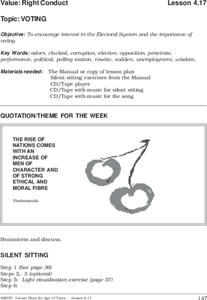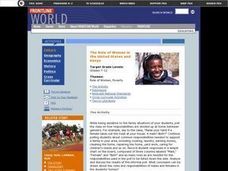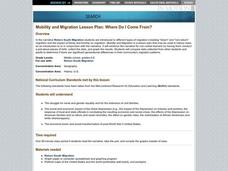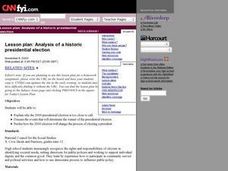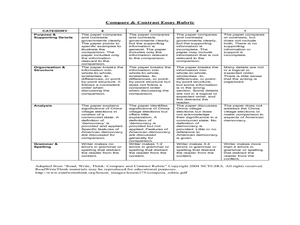Curated OER
The Times, Are They A-Changing?
Students read and discuss article, "We Agreed to Agree, and Forgot to Notice," participate in anonymous mock presidential primary ballot, and share reactions to Iowa caucus results. Students then collect statements made by candidates on...
Curated OER
Electing the U.S. President
In this reading comprehension worksheet , students read a factual essay about the American election process. Students then answer 7 questions about this information.
Curated OER
One Survivor Remembers: Anti-Semitism
Students analyze and discuss how propaganda influenced anti-Semitism and it's role in World War II. In this propaganda lesson plan, students define the terms involved in this assignment. Then they will discuss their reactions to a film...
Curated OER
2002: The Year In Review
Young scholars research and create a book highlighting significant events and trends throughout the world in the year 2002. Then, through creative writing, they respond to the events or trends themselves and how they affected our world.
Curated OER
The Crucible
Students explore the historical drama, "The Crucible" by Arthur Miller looking for examples of society's mistrust of nonconformity and the injustice that can as a result of fear.
Curated OER
The Role Of NATO
Students examine the role of the North Atlantic Treaty Organization (NATO). In this NATO instructional activity, students research the Truman Doctrine, the Marshall Plan, Winston Churchill's "Iron Curtain" speech, and the Berlin airlift...
Curated OER
VOTING
Young scholars discuss 'The importance of voting'. They elect 5 candidates - each representing one of the five values. Each candidate presents a case why their value is important. The other class members then vote for whichever...
Curated OER
The Role of Women in the United States and Kenya
Students compare the responsibilities and rights of women in the US and in Kenya. They examine how gender affects societal roles.
Curated OER
Women’s Suffrage
Students examine several aspects of the Women's Suffrage Movement. In this women's rights lesson, students explore several primary and secondary sources regarding the events of the movement, opposition to the movement, and the effects of...
Curated OER
Your Vote Counts! Election Activity
Students participate in a simulated election. They serve as 'checkers', marking off names of those who vote, a ballot person hands out ballots, and ballot sorters and counters. Teacher rigs up a voting booth where voters mark ballots...
Curated OER
WHERE DO I COME FROM?
Students analyze the struggle for racial and gender equality and for the extension of civil liberties, the social and economic impact of the Great Depression, and the economic boom and social transformation of post-World War II United...
Curated OER
Minority Report
Students examine race relations in Great Britain. In this current events lesson, students visit selected websites to understand the impact of immigration on the country as well as multiculturalism in the country.
Curated OER
The Voting Game
Young scholars examine and discuss the Canadian electoral process. They conduct a simulation of the electoral process, with students running as candidates, holding a convention, campaigning, and voting for Prime Minister of the Day.
Curated OER
Hindsight is 20-20Presidential First 100 DaysPresentation
Students interpret historical evidence presented in primary and secondary resources. For this American history lesson, students research the first 100 days of several American Presidents. Students use their research findings...
Curated OER
From the Classroom to the Ballot Box
Students examine British voting rights. In this current events lesson, students listen to a lecture about the proposal to drop the British voting age to 16. Students create and distribute surveys about the proposal and debate voting rights.
Curated OER
Analysis of a Historic Presidential Election
Learners research the 2000 presidential elections. They explain why the presidential winner was initially too close to call, discuss how the winner was determined and predict how the 2000 election might change the process of electing a...
Curated OER
Bioweapons - Are You Safe?
Learners investigate bioterrorism and bioweapons as ways to transmit contagious diseases. Student examine the way the US is protecting itself from bioterrorism.
Curated OER
Un-Presidented Election
Students explore the results of the 2000 presidential election. They look back at important issues in the campaign and write newspaper articles which cover specific angles on the election.
Curated OER
YOUR OWN CAMPAIGN
Twelfth graders, in groups propose a new law and design a campaign to get people to vote for their law. They have a voter's forum and hold a mock election.
Curated OER
Government: The Power of Persuasion
High schoolers are able to define and identify a type of interest group. They are able to describe some strategies used by interest group. Students are able to identify the postive and negative aspects of interest groups.
Curated OER
The Immigrants of Brooklyn: Now And Then
Students compare the immigrant population during the pre-Civil War era (1855) to that of today (2000 census data). They interpret circle and bar graphs comparing immigrant populations in Brooklyn yesterday and today, and create a class...
Curated OER
Democratic Village Elections in China: Comparing Governments of China and the United States
Students explore democratic practices in China. In this global studies lesson, students compare and contrast democratic values of the Chinese government with the American government. Students read provided articles and conduct their own...
Curated OER
Elections - Mobilization Versus Suppression
Students analyze voter suppression. In this voting practices lesson plan, students listen to their instructor present a lecture comparing voter suppression and voter mobilization. Students respond to the provided discussion questions.
Curated OER
Congressional Scenarios
In this U.S. government worksheet, students read 12 scenarios pertaining to government intervention and determine what to do as lawmakers in response to each of the scenarios.








